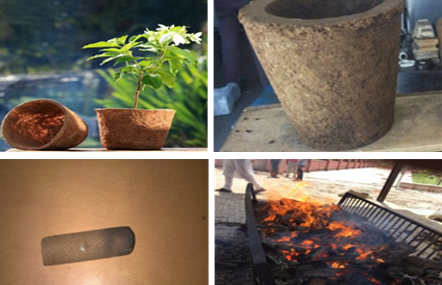Execution of reformative approach to promote societal acceptance for prison inmates
Details:
As cow dung has a multifarious set of applications transforming it into a pot or log offers a huge opportunity for eco-friendly widespread applications. Conventionally, non-biodegradable plastic bags are used to grow plant saplings. As these plastic bags lack porosity, after germination, the bag has to be torn off to facilitate root growth and in case the bag is not torn properly the plant gets damaged. Shri Pareshbhai Panchal has developed an eco-friendly manually operated portable pot-making machine by using cow dung and agriculture waste, which is completely biodegradable. Since cow dung has manure properties, the pots made out of it retain them and ensure effective utilization of agro-waste. The machine is easy to use. A single person can perform all the processes viz. mixing, feeding, and handling output product. Production of uniform quality pots. With comparable CV (Calorific value) with wood or white coal, it can be a good substitute to them even for industrial purposes. Deployment of such innovations in, dairy farms enhance the probability, potential, and opportunity to do business and earn not only from the sale of milk but also from the sale of secondary products such as cow dung. The technology was implemented at Correctional Home in Dasna, Gurugram, and Dharamshala.
“Prison inmates were trained to utilize the innovative concept of cow dung pot making machine. The pots created using this technology were showcased at the Shimla exhibition. Also, plant nursery, welding iron component to make plant stand and other reformative activities are being carried out in correctional homes,” said Shri Vikas Bhatnagar, Deputy Superintendent Jail.
As prisons are ubiquitous throughout the country, the implementation of such an innovative technology for reformation and societal integration in correctional homes can serve as a model for the rest of the world. Reformations have been made in the arena of correction all around the world to maintain the rights of the prisoners and successfully reintegrate them into society and help them lead dignified life. In correctional homes, such approaches have provided an opportunity to prison inmates for skill development, a chance to contribute towards sustainability as well as ensure economic security for their family members. The developed skill has aided in the economic engagement of prison inmates. Thus, paved a way for the integration and societal acceptance of this excluded section of the society.
